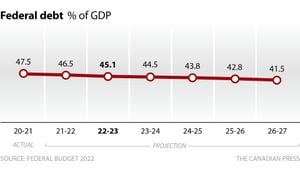Camden Council is currently facing scrutiny over its "defensive" complaints culture, which has emerged as a significant issue highlighted by the Housing Ombudsperson. This criticism arises from findings indicating the council has adopted practices perceived as dismissive, potentially discouraging residents from filing legitimate complaints. Such behavior could lead to unresolved issues within the housing sector, adversely affecting those who rely on the council for their housing needs.
An investigation undertaken by the Housing Ombudsman reviewed numerous complaints against Camden Council, yielding over 120 findings of maladministration. The report noted alarming statistics, with maladministration being cited at an 83% rate throughout the 2023-24 period. This suggests many complaints were not handled appropriately, leaving residents feeling neglected and dissatisfied.
Among the poignant accounts during this investigation was the case of a resident referred to as Mr. S. Living with arthritis and chronic obstructive pulmonary disease, Mr. S found himself unable to use the stairs effectively. His building's lift was non-functional for over 686 days, and he was forced to navigate 94 stairs multiple times daily. Due to the lift’s breakdown, he resorted to living temporarily in a wooden shack devoid of heating or hot water.
Despite the clear distress Mr. S was experiencing, it took considerable time and effort for the council even to engage with him on his plight. Both his GP and social services advocated for his relocation, yet Camden Council failed to communicate effectively or explore the necessary support options for him and his service dog during the lift's prolonged failure.
The Ombudsman’s report categorized these incidents as significant failures, particularly highlighting the lack of proactive measures taken by the council. This reflects inadequacies not just surrounding the physical infrastructure of housing but also how residents are treated, especially those facing vulnerable situations.
Steps Toward Improvement
Despite the criticism, Camden has reportedly started implementing improvements. Richard Blakeway, the Housing Ombudsman, underscored the importance of effective complaint handling, recognizing the council’s shift toward viewing complaints as opportunities for enhancement rather than failures. This change is evident as Camden received the ombudsman’s approval for attempting to adopt new policies aimed at creating constructive communication channels with residents.
This shift, as noted by Blakeway, is imperative. Concerns remain especially around how issues like repair management and communication with vulnerable residents are being handled. The focus will be on developing processes and training to align with established standards necessary for proper complaint management.
Among the identified recommendations for improving practices is establishing clearer processes for identifying, acknowledging, and investigating complaints, along with consistent guidelines for compensations where applicable. This is intended to create transparency and clarity within the system.
The Reality of Property Condition Complaints
Property conditions have emerged as the primary driver behind complaints against Camden. The report outlined various systemic failures such as inaccuracies in repair records, lack of follow-ups, and recurrent unsuccessful repair efforts. These inefficiencies not only lead to frustration among residents but also compound the problems they are already facing.
For example, another case noted within the report involved a leaseholder who waited over six years to receive any response related to their renovation complaint. Such extensive delay raises questions around the operational effectiveness of the council's processes and its overall commitment to addressing resident grievances.
Dampness, leaks, and pest infestations were frequently reported issues, indicating broader problems within the maintenance framework. Recommendations included developing systematic methods for tracking repair requests until completion to streamline the process and improve resident experiences.
Support for Vulnerable Residents
An alarming aspect of the report highlighted Camden’s inadequate response to vulnerable residents. Instances included significant delays when responding to requests for reasonable accommodations, such as when BSL interpreters were needed for communication. A deaf resident's request for interpretation led to delays lasting over four months before alternatives were proposed.
This lack of recognition of residents’ vulnerabilities can lead to serious oversights and exacerbate the struggles these individuals face. It draws attention to the need for the council to develop effective policies centered around reasonable adjustments and proper communication techniques aimed at supporting residents experiencing various disabilities.
Looking Ahead
Camden Council has committed to employing measures to boost their services, acknowledging past failures and vowing to improve their engagement strategies. This includes establishing panels for resident feedback and oversight to involve the community more actively, fostering trust and cooperation.
These promises come following extensive criticism and highlighted failures within their housing management systems. Continued engagement with the Housing Ombudsman will be key to ensuring changes are effectively implemented.
Local authorities are under added pressure as they navigate limited resources and the growing demands of residents seeking safe, adequate housing. Camden's challenges are not unique—entire regions are grappling with similar issues as budgets tighten and the need for affordable housing escalates.
Richard Blakeway has emphasized the importance of recognizing and acting on missed opportunities to remedy problems, advocating for both operational adjustments and shifts toward respectful engagement with residents. The road to recovery for Camden remains long, but initial steps show promise if they manage to internalize the lessons learned from the Ombudsman’s findings.
This situation serves as both cautionary tale and potential blueprint for housing authorities everywhere. The visible neglect experienced by residents and the systemic inefficiencies call for urgent attention and action to create environments where complaints are not symptoms of larger systemic dysfunctions but opportunities for respective councils to evolve and adapt to their communities' needs. The onus is now on Camden to prove their commitment to these promises and restore trust among the residents they serve.



